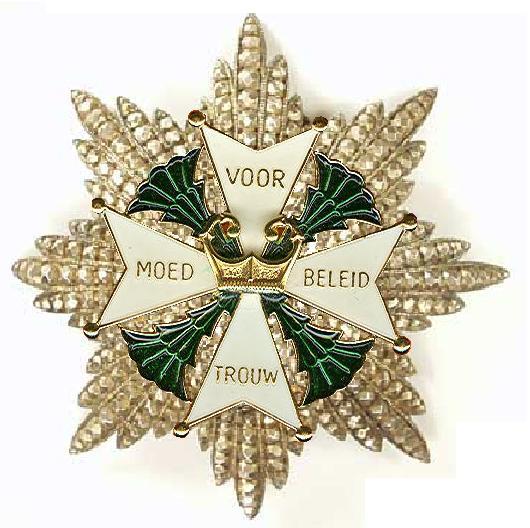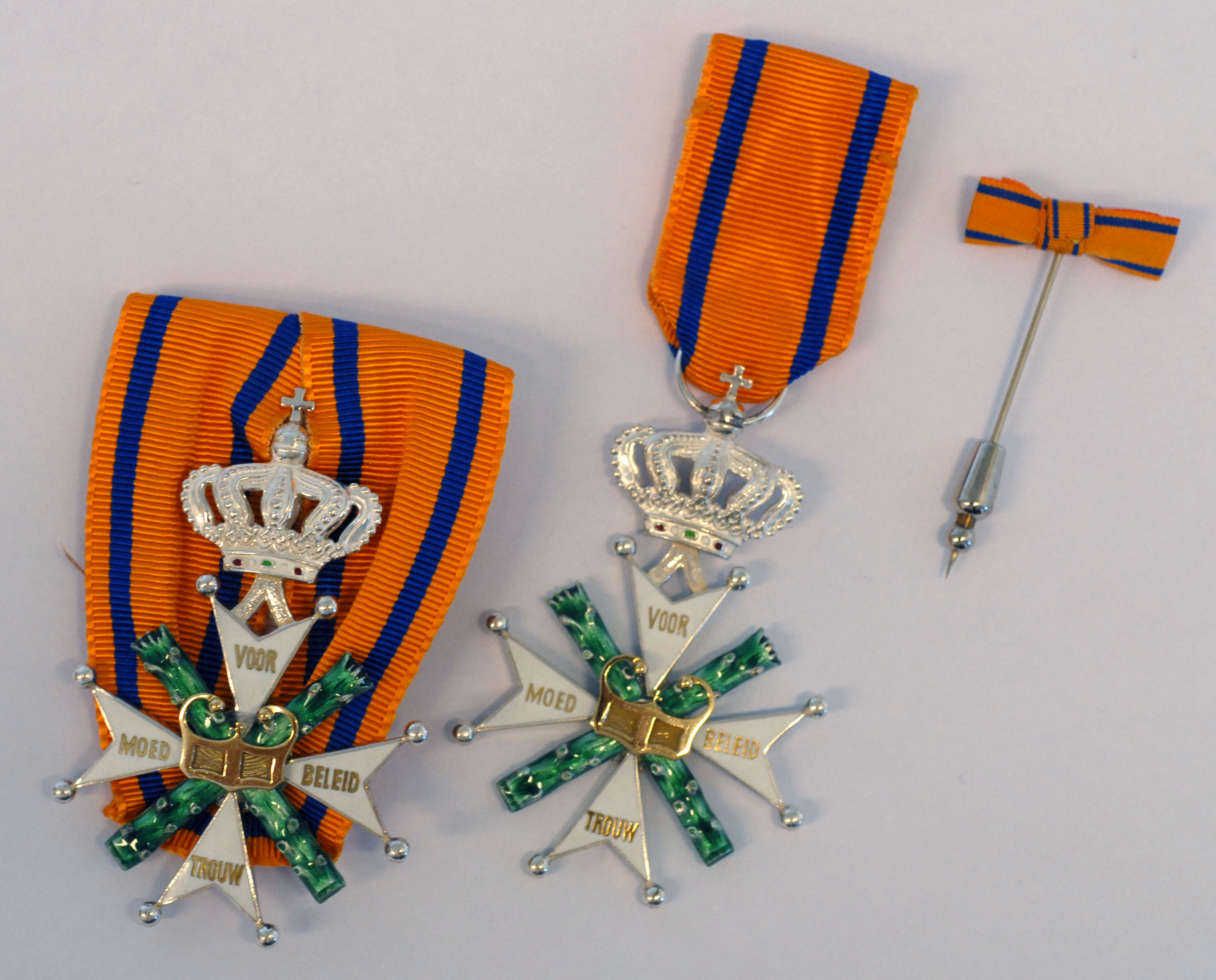|
Silver Memorial Cross, 1813-1815 (Netherlands)
The Silver Memorial Cross 1813-1815, () was a campaign medal instituted by King William III of the Netherlands on 10 May 1865. It was awarded to surviving veterans of the Dutch armed forces who, between 1813 and 1815, helped to restore Dutch independence. This included participating in the 1814 campaign to end the occupation of the Netherlands by Napoleon's French forces, and in the final Hundred Days campaign of 1815, including the battles of Battle of Quatre Bras, Quatre Bras and Battle of Waterloo, Waterloo. The first Silver Memorial Crosses were presented on 27 June 1865 on the 50th anniversary of the founding of the Military Order of William. Of the approximately 30,000 who took part in the relevant campaigns, about 5,000 veterans survived to receive the cross.H.S. Hovinga, ''Het Zilveren Kruis 1813-1815; in Nederland gebeurt alles vijftig jaar later.'' Article in ''Decorare'', issue 1. May 1999. . The decoration is a five-armed silver cross, 35 mm at its widest point. ... [...More Info...] [...Related Items...] OR: [Wikipedia] [Google] [Baidu] |
Napoleon
Napoleon Bonaparte ; it, Napoleone Bonaparte, ; co, Napulione Buonaparte. (born Napoleone Buonaparte; 15 August 1769 – 5 May 1821), later known by his regnal name Napoleon I, was a French military commander and political leader who rose to prominence during the French Revolution and led successful campaigns during the Revolutionary Wars. He was the ''de facto'' leader of the French Republic as First Consul from 1799 to 1804, then Emperor of the French from 1804 until 1814 and again in 1815. Napoleon's political and cultural legacy endures to this day, as a highly celebrated and controversial leader. He initiated many liberal reforms that have persisted in society, and is considered one of the greatest military commanders in history. His wars and campaigns are studied by militaries all over the world. Between three and six million civilians and soldiers perished in what became known as the Napoleonic Wars. Napoleon was born on the island of Corsica, not long af ... [...More Info...] [...Related Items...] OR: [Wikipedia] [Google] [Baidu] |
Military Awards And Decorations Of The Netherlands
A military, also known collectively as armed forces, is a heavily armed, highly organized force primarily intended for warfare. It is typically authorized and maintained by a sovereign state, with its members identifiable by their distinct military uniform. It may consist of one or more military branches such as an army, navy, air force, space force, marines, or coast guard. The main task of the military is usually defined as defence of the state and its interests against external armed threats. In broad usage, the terms ''armed forces'' and ''military'' are often treated as synonymous, although in technical usage a distinction is sometimes made in which a country's armed forces may include both its military and other paramilitary forces. There are various forms of irregular military forces, not belonging to a recognized state; though they share many attributes with regular military forces, they are less often referred to as simply ''military''. A nation's military may ... [...More Info...] [...Related Items...] OR: [Wikipedia] [Google] [Baidu] |
Orders, Decorations, And Medals Of The Netherlands
In the Dutch honours system, most orders are the responsibility of ministers of the Netherlands Government. The house orders, however, are awarded at the discretion of the Dutch monarch alone. Over the centuries, hundreds of medals, decorations for merit or valour and orders of knighthood have been instituted by the successive governments of the Netherlands. The oldest were founded by the counts of Holland. Their successors, the House of Burgundy, founded the famous Order of the Golden Fleece. This order still exists in Spain and in the Austrian imperial House. The Republic of the Seven United Netherlands did not possess an order of knighthood. Instead so called "Beloningspenningen", golden medals on golden chains, were given as gifts to ambassadors and successful admirals. In 1781 a medal called the "Doggersbank medaille" was awarded to the officers who took part in the Battle of the Dogger Bank against the British fleet. It was the first modern Dutch decoration. The Batavi ... [...More Info...] [...Related Items...] OR: [Wikipedia] [Google] [Baidu] |
Military Order Of William
The Military William Order, or often named Military Order of William (Dutch: , abbreviation: MWO), is the oldest and highest honour of the Kingdom of the Netherlands. It is named after St. William of Gellone (755–814), the first Prince of Orange. Its motto is (For Bravery, Leadership and Loyalty). The chivalric order was established on 30 April 1815 by King William I and was presented for feats of excellent bravery on the battlefield and as a meritorious decoration to senior military officers. Comparable with the French Légion d’Honneur but far less often awarded, it is open to everyone regardless of rank or nobility—not only to Dutch military, but also to foreigners. To date, membership in the Order is extremely rarely awarded, and only for exceptional bravery in battle. In the spring of 1940 it was decided that civilians would receive the Order for heroic acts in the resistance. After the liberation of the Netherlands and the Dutch East Indies, several men and one wom ... [...More Info...] [...Related Items...] OR: [Wikipedia] [Google] [Baidu] |
Battle Of Waterloo
The Battle of Waterloo was fought on Sunday 18 June 1815, near Waterloo, Belgium, Waterloo (at that time in the United Kingdom of the Netherlands, now in Belgium). A French army under the command of Napoleon was defeated by two of the armies of the Seventh Coalition. One of these was a British-led coalition consisting of units from the United Kingdom of Great Britain and Ireland, United Kingdom, the Netherlands, Kingdom of Hanover, Hanover, Duchy of Brunswick, Brunswick, and Duchy of Nassau, Nassau, under the command of the Duke of Wellington (referred to by many authors as ''the Anglo-allied army'' or ''Wellington's army''). The other was composed of three corps of the Kingdom of Prussia, Prussian army under the command of Field Marshal Gebhard Leberecht von Blücher, von Blücher (the fourth corps of this army fought at the Battle of Wavre on the same day). The battle marked the end of the Napoleonic Wars. The battle was contemporaneously known as the Battle of Mont Saint-J ... [...More Info...] [...Related Items...] OR: [Wikipedia] [Google] [Baidu] |
Battle Of Quatre Bras
The Battle of Quatre Bras was fought on 16 June 1815, as a preliminary engagement to the decisive Battle of Waterloo that occurred two days later. The battle took place near the strategic crossroads of Quatre Bras and was contested between elements of the Duke of Wellington's Anglo-allied army and the left wing of Napoleon Bonaparte's French ''Armée du Nord'' under Marshal Michel Ney. The battle was a tactical victory for Wellington (as he possessed the field at dusk), but because Ney prevented him going to the aid of Blucher's Prussians who were fighting a larger French army under the command of Napoleon Bonaparte at Ligny it was a strategic victory for the French. Prelude Facing two armies (Wellington's arriving from the west and the Prussians under Field Marshall von Blücher from the east), Napoleon's overall strategy was to defeat each in turn, before these forces could join. Napoleon intended to cross the border into what is now Belgium (but was then part of the Uni ... [...More Info...] [...Related Items...] OR: [Wikipedia] [Google] [Baidu] |
Hundred Days
The Hundred Days (french: les Cent-Jours ), also known as the War of the Seventh Coalition, marked the period between Napoleon's return from eleven months of exile on the island of Elba to Paris on20 March 1815 and the second restoration of King Louis XVIII on 8 July 1815 (a period of 110 days). This period saw the War of the Seventh Coalition, and includes the Waterloo Campaign, the Neapolitan War as well as several other minor campaigns. The phrase ''les Cent Jours'' (the hundred days) was first used by the prefect of Paris, Gaspard, comte de Chabrol, in his speech welcoming the king back to Paris on 8 July. Napoleon returned while the Congress of Vienna was sitting. On 13March, seven days before Napoleon reached Paris, the powers at the Congress of Vienna declared him an outlaw, and on 25March Austria, Prussia, Russia and the United Kingdom, the four Great Powers and key members of the Seventh Coalition, bound themselves to put 150,000 men each into the field to end ... [...More Info...] [...Related Items...] OR: [Wikipedia] [Google] [Baidu] |
William III Of The Netherlands
William III (Dutch: ''Willem Alexander Paul Frederik Lodewijk''; English: ''William Alexander Paul Frederick Louis''; 19 February 1817 – 23 November 1890) was King of the Netherlands and Grand Duke of Luxembourg from 1849 until his death in 1890. He was also the Duke of Limburg from 1849 until the abolition of the duchy in 1866. William was the son of King William II and Anna Pavlovna of Russia. On the abdication of his grandfather William I in 1840, he became the Prince of Orange. On the death of his father in 1849, he succeeded as king of the Netherlands. William married his cousin Sophie of Württemberg in 1839 and they had three sons, William, Maurice, and Alexander, all of whom predeceased him. After Sophie's death in 1877 he married Emma of Waldeck and Pyrmont in 1879 and they had one daughter Wilhelmina, who succeeded William to the Dutch throne. Meanwhile, being the last agnatic dynastic descendant of Otto I, Count of Nassau, the throne of the Grand Duchy of Luxembou ... [...More Info...] [...Related Items...] OR: [Wikipedia] [Google] [Baidu] |
Baton Zilveren Herdenkingskruis 1813-15
Baton may refer to: Stick-like objects *Baton, a type of club * Baton (law enforcement) *Baston (weapon), a type of baton used in Arnis and Filipino Martial Arts *Baton charge, a coordinated tactic for dispersing crowds of people *Baton (conducting), a short thin stick used for directing a musical performance *Baton (military), a symbolic attribute of military or other office *Baton (running), an object transferred by runners in a relay race *Baton sinister, a mark of cadency in heraldry *Baton twirling, a light metal rod used for keeping time, twirling in competitions, etc. *Baton, a smaller version of a baguette *Baton, in stick juggling, the central stick, which is manipulated with the side-sticks (control sticks) *Baton, another word for a batonette, a culinary knife cut *Batons, in the keyboard of a carillon, the stick-like keys used to play the bells *Batons (suit), one of the four suits of playing card in the standard Latin deck *Suit of wands, Batons in the tarot card O ... [...More Info...] [...Related Items...] OR: [Wikipedia] [Google] [Baidu] |
Waterloo Campaign
The Waterloo campaign (15 June – 8 July 1815) was fought between the French Army of the North (France), Army of the North and two Seventh Coalition armies, an Anglo-allied army and a Prussian army. Initially the French army was commanded by Napoleon Bonaparte, but he left for Paris after the French defeat at the Battle of Waterloo. Command then rested on Marshals Marshal Soult, Soult and Marshal Grouchy, Grouchy, who were in turn replaced by Marshal Davout, who took command at the request of the French Provisional Government. The Anglo-allied army was commanded by the Duke of Wellington and the Prussian army by Gebhard Leberecht von Blücher, Prince Blücher. The war between France and the Seventh Coalition came when the other European Great Powers refused to recognise Napoleon as Emperor of the French upon his return from exile on the Principality of Elba, island of Elba, and declared war on him, rather than France, as they still recognised Louis XVIII as the king of France ... [...More Info...] [...Related Items...] OR: [Wikipedia] [Google] [Baidu] |







